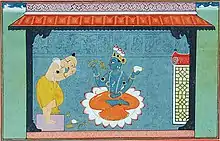Madhava (Vishnu)
Madhava (Sanskrit: माधव, romanized: Mādhava) is one of the primary epithets of Vishnu and Krishna. The word Mādhava in Sanskrit is a vṛddhi derivation of the word Madhu (Sanskrit: मधु), which means honey. It is a title of Krishna, referring to his lineage as 'he who appeared the Madhu dynasty'.[1]


In the Bhagavad Gita, Arjuna addresses Krishna as Madhava (meaning "lord of fortune"; not to confused with a secondary name, Madhusudana, which means "slayer of the demon Madhu").[2]
According to Adi Shankara's commentary on the Vishnu Sahasranama and the Narada Pancharatra, Madhava means the consort (dhava) of the mother (ma), referring to Lakshmi, the goddess called the 'mother of the universe'. Alternatively, it means the 'one who is fit to be known through Madhu-vidya', or can mean the 'one who is the lord of ma, or knowledge.[3]
Literature
In the Skanda Purana, Shiva mentions Madhava as an epithet of Vishnu, described as the one who holds the conch, discus and mace.[4]
In the Garuda Purana, the hymn to Vishnu composed by Markandeya includes the verse, "I crave the mercy of Madhava and of Janardana, what shall Death do unto me?"[5]
| Part of a series on |
| Vaishnavism |
|---|
 |
In the Harivamsa Purana, during the episode of Krishna's elopement with Princess Rukmini, the epithet is mentioned during his battle against Rukmi:
Although Rukshmi was very careful the highly powerful and valiant Madhava cut off the standard of his car and the head of his charioteer from his body.
— Harivamsa Purana, Chapter 61
References
- www.wisdomlib.org (2009-04-12). "Madhava, Mādhava, Mādhavā: 29 definitions". www.wisdomlib.org. Retrieved 2022-08-02.
- Maharishi Mahesh Yogi on the Bhagavad-Gita, a New Translation and Commentary, Chapter 1-6. Penguin Books, 1969, p 37 (v 14)
- "Narada Pancharatra [relj32kmyvn1]". idoc.pub. Retrieved 2022-08-02.
- www.wisdomlib.org (2021-04-16). "Greatness of Mādhava [Chapter 299]". www.wisdomlib.org. Retrieved 2022-08-02.
- www.wisdomlib.org (2015-04-16). "The hymn to Vishnu composed by the holy Markandeya [Chapter CCXLIII]". www.wisdomlib.org. Retrieved 2022-08-02.